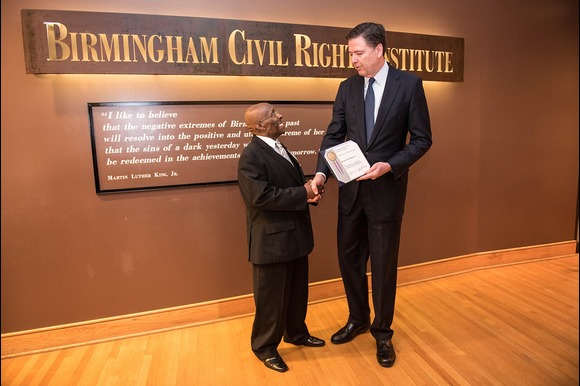Former FBI Director James Comey has been formally indicted by a federal grand jury on two charges—making false statements to Congress and obstruction of justice. The indictment, issued in Virginia just days after President Donald Trump urged top law enforcement officials to intensify investigations into political rivals, marks one of the most consequential legal challenges faced by a U.S. law enforcement figure in recent history.
Comey, who led the FBI from 2013 to 2017, has denied any wrongdoing and insists he is innocent. He is accused of lying to the Senate Judiciary Committee in 2020 about whether he authorized a leak of information tied to an FBI investigation, and of obstructing the congressional probe with false testimony.
If convicted, Comey faces up to five years in prison. His arraignment is scheduled for October 9 in Alexandria, Virginia, where the charges will be formally read in court.
Details of the Indictment
The two-page indictment charges Comey with:
- One count of making false statements – alleging he misled Congress by claiming he never authorized FBI staff to serve as anonymous sources in media reports related to the Hillary Clinton investigation.
- One count of obstruction of justice – accusing him of corruptly attempting to obstruct a Senate panel by repeating false statements.
A third count of making false statements was considered but rejected by the jury.
Notably, the indictment was filed just days before the five-year statute of limitations would have expired.
Comey’s Response: “I Am Innocent. Let’s Have a Trial”
After the indictment was announced, Comey released a video message:
“My family and I have known for years that there are costs to standing up to Donald Trump. We will not live on our knees, and you shouldn’t either. I am innocent. So, let’s have a trial.”
Comey has said he has “great confidence in the federal judicial system”, framing the charges as politically motivated retaliation by his long-time adversary, Donald Trump.
Trump Welcomes Indictment, Calls Comey “A Dirty Cop”
President Trump publicly welcomed the indictment, declaring:
“He got caught lying to Congress. It’s about justice, not revenge. I think there will be others.”
While Trump denied having prior knowledge of the indictment, he has repeatedly voiced frustration about the slow pace of prosecutions against critics such as Comey, Representative Adam Schiff, and New York Attorney General Letitia James.
Political Context and Prosecutorial Shifts
The case is being led by Lindsey Halligan, the newly appointed U.S. Attorney for the Eastern District of Virginia, who was previously a personal lawyer to Trump. She replaced Erik Siebert, the original U.S. attorney overseeing the probe, who departed amid reports of pressure from the administration.
Attorney General Pam Bondi, also seen as close to Trump, defended the indictment, stating:
“This reflects the Department of Justice’s commitment to holding those who abuse positions of power accountable for misleading the American people.”
The unusual handling of the case has raised alarms about the erosion of the traditional firewall between the White House and the Department of Justice.
Legal Challenges Ahead
Legal experts say the prosecution may be difficult to prove. Laurie Levenson, a former federal prosecutor, told BBC News:
“Even if James Comey got things wrong, that doesn’t mean he knowingly or intentionally lied to Congress. Proving intent will be the heart of the case.”
She also warned that Trump’s public pressure on prosecutors suggests the independence of the Justice Department has collapsed in this case.
Reactions Across the Political Spectrum
- Democrats denounced the charges. House Democratic leader Hakeem Jeffries called the indictment “a disgraceful attack on the rule of law” and promised accountability for what he termed “malignant corruption.”
- Republicans, by contrast, celebrated the move as long overdue.
The indictment has already deepened partisan divides and added to fears of politically driven prosecutions during Trump’s second term.
Fallout for Comey’s Family
The indictment has also triggered resignations within Comey’s own family:
- His son-in-law, Troy Edwards Jr., resigned from the Eastern District of Virginia on Thursday, citing a duty to uphold the Constitution.
- His daughter, Maurene Comey, was fired earlier this year from the U.S. Attorney’s Office in New York, where she had served for a decade. She has since filed a lawsuit against the Trump administration, alleging wrongful dismissal.
Background: Comey’s Tumultuous Career
Comey, who served as FBI director from 2013 until being fired by Trump in 2017, oversaw some of the most controversial investigations of modern U.S. politics:
- The FBI’s probe into Hillary Clinton’s use of a private email server just weeks before the 2016 election.
- The Russia election interference investigation, which scrutinized ties between Trump’s campaign and Moscow.
Comey has long been a polarizing figure—vilified by Trump supporters but defended by critics of the former president as a public servant targeted for political revenge.
Conclusion
The indictment of James Comey represents one of the highest-profile prosecutions of a public official in decades and could reshape public trust in the Justice Department. With the arraignment set for October 9, the case is expected to become a political and legal flashpoint, testing both the independence of federal prosecutors and the limits of presidential influence.






